
I found this book delivered to my front doorstep on Christmas morning, sent by a thoughtful reader of this blog, a college roommate.
It is an amazing book, on an topic of mind-boggling intricacy.

I was an early adopter of the iPhone some fifteen years ago. At that time, the internet for mobile devices was in its infancy. It was amazing then that you could pull up the New York Times front page wherever you were. But at that time, the capability was to get an image of the full-size printed page, and enlarge a portion of interest by reverse pinching. The immediate impetus for me to get a cell phone was the set of problems created by trying to keep my incapacited mother at home, 800 miles away, at the same time as pursuing my professional career.
For a while, it was cool, like any new toy. And it allowed me a bit of flexibility in my comings and goings, so that I could respond to business needs without being at my desk. After a year or two, the thrill wore off. I really do not want impatient people to call me while I'm out enjoying nature, nor do I want to surf the web while I'm in the grocery store. So, I got rid of it, and lived happily ever after…
… until it became the norm for everybody to have an iPhone, or something like it, whether they liked it or not. Then, for the convenience and advantage of suppliers of services of all sorts, it became required as part of two- (or even three-) factor identity verification. I finally broke down and re-aquired a cell phone when having one became a necessity for income tax filing.
After close to a year of service, I have not used my cell phone to make or receive a call, to send a text message, or to browse the web. It sits plugged in on my desk inches from my iMac and my home phone. It gets used once every month or two to receive a one-time code. That is fine with me, though it is rather pricey for the actual use.
Montesquieu writes –
Men care prodigiously for their laws and their customs; these make the felicity of every nation; it is rare for them to be changed without great upsets and a great shedding of blood, as is shown in the histories of all countries.
He goes on to note that some local rules may be unjustifiable because they are disproportionate, and proposes an example:
From this it follows that one has not conformed to the nature of things in that Italian republic where bearing firearms is punished as a capital crime and where it is no more dangerous to make bad use of them than to bear arms.
I wonder.
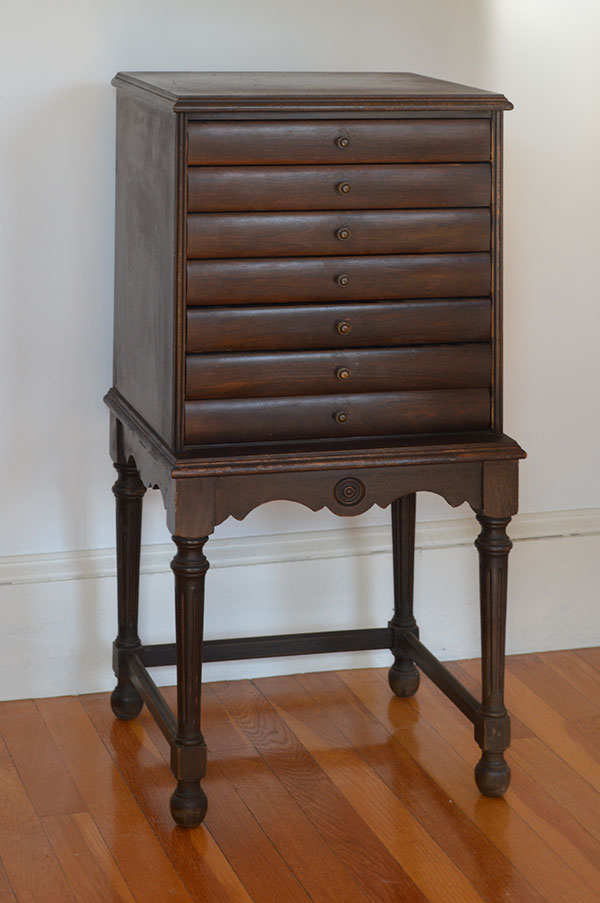
I have recurring clutter with sheet music, in various piles and loose sheets. Sheet music is printed on oversized paper, usually without hard covers, so it does not lend itself to bookshelf storage. It really needs to be laid flat, but stacking makes it a nuisance to fish out something from somewhere in the middle… it's hard to tell just where it is without taking things apart.
There are cabinets made specifically for the purpose. Like most specialty items, they are not cheap. After browsing through some commerical options, I decided to try a local antique store, thinking I might find something I could modify for the purpose. I had freakishly good luck, finding a very nicely constructed Honduras mahogany piece for $150, about a tenth of its market value.
Curiously, the owner of the shop knew what it was. His wares generally date from the pre-television age, when people's indoor amusement activity was often the piano. He will soon be closing his shop, which for decades did a booming business in the area, along with one other, The White Elephant, recently closed. He noted that the antique business is suffering from a clear decline in the last decade, as young people simply have no desire for old things.
Myself, I have no desire for more possessions, new or old. I have too many. At least this one will help me manage the clutter.

This photograph was on the cover of Harvard Magazine some three decades ago. I was very struck by it. I was in the middle of building a new career in health care. I promised myself that the first money I earned in the new career would go to purchasing a copy of the picture. I vastly underestimated the time it would take me to earn the first few dollars, and vastly overestimated how much the print would cost. In the event, the photography department of Massachusetts Eye & Ear Hospital made me a copy for a trivial sum. Unfortunately, they did not print it on acid-free paper, and it had become very stained.
I finally got it reprinted. Most of my artistic tastes evolve and change, but I still love this picture.
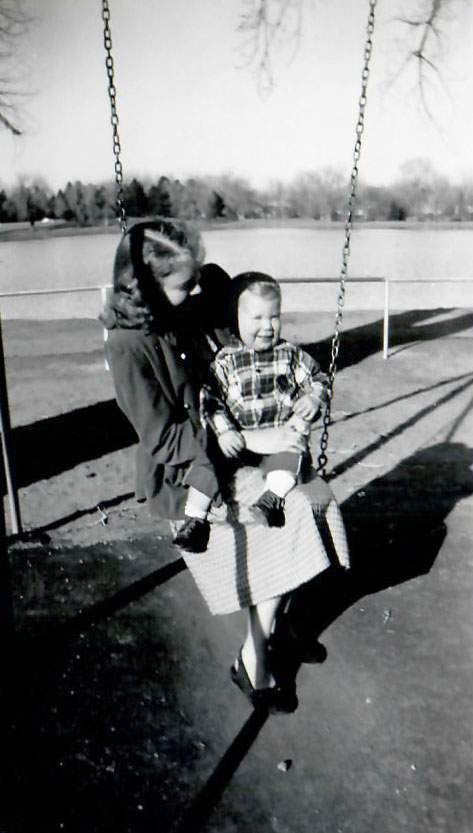
It is the tenth anniversary of my mother's death.![]() However, it is not of her last days that I want to think – the end of life usually isn't pretty – but of the wonder and joy of the long years we shared together.
However, it is not of her last days that I want to think – the end of life usually isn't pretty – but of the wonder and joy of the long years we shared together.
Our bond was extremely close, even as mother-child relationships go. Much of what we shared is reflected here and in my home and daily life.
My mother was an empathetic and active human being. She was also a professional during the latter part of her life. Her human qualities were the most important part of her, I think. They continued, or grew, after her career was complete.
Just I learned to love art from her, she learned to love literature from me. Over a period of time, this became a passion and core part of her life. She explored in many directions besides those I had followed.
At this distance, her fundamental curiosity – in learning and doing – is the characteristic most memorable to me. To this day, people remark that I have the same trait. I hope so! That is a wonderful trait to have passed on.
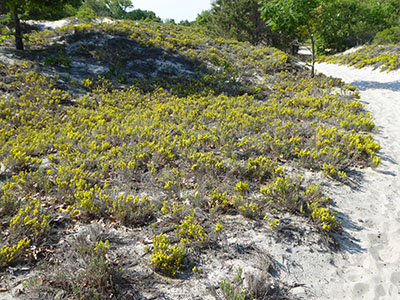
One the the most dominant, and pehaps the dominant, species of vegetation at the Crane Estate is beach heather, Hudsonia tomentosa Nutt. There are countless acres of it.
The U.S. Department of Agriculture has an excellent summary sheet about it. H. tomentosa is notable for its ability to thrive in very dry, nutrient-poor sand dunes, where few other things can take root. The USDA remarks,
In various coastal locations in the mid-Atlantic, beach heather has been observed to preclude other plants from growing in close proximity. Coastal scientists suspect that beach heather is capable of producing allelopathic compounds to reduce competition from other species.
Indeed, the broad expanses of beach heather that I observe have little other vegetation interspersed, whether because of such allelopathic secretions or simply because little else will grow in such a sterile environment. I suspect both. The beach heather does occur in close proximity with reindeer lichen, scrub oak, and beach grass (Ammophila breviligulata). There are heather-free areas under beach pine, but I guess that this is only because the pine create deep shade, with droppings of duff below – an environment inhospitable for beach heather. You can see the shady, relatively bare spot in the picture above.
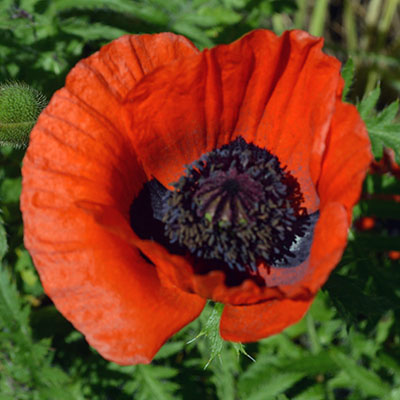
Poppies are among my favorite flowers. These are more striking with their bright red color. They do not last very long – but that transience is part of the intrigue of flowers.
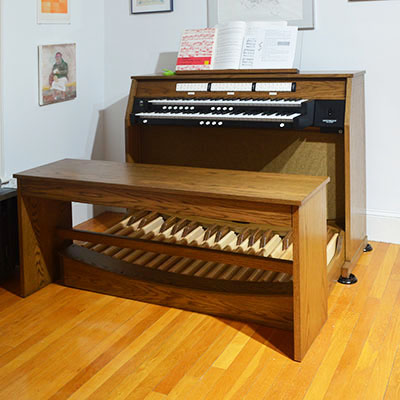
The organ has come.
I thought about this decision long and hard, especially because it was a plunge into uncharted waters.
But viewed from the long-term perspective, taking up the piano as an adult was one of the best decisions I have made in my life. I have a curious mind and thrive on goals. And my love for music has been constant over the decades. I am happy having attained an intermediate level of ability. I would add that the experience of the last year with video-making clearly demonstrated to me that I am still capable of learning, perhaps more so than when I was younger. There are limits, but I haven't reached them yet.
An accomplished organist recalled to me the advice of her teacher, that all that the organ and the piano have in common is that they have keyboards. So, I will begin at the beginning and expect that it will take five years for me to attain a level of ability that will satisfy me. I will be careful in the first few months to build good habits.
The heading "Arrival of the organ" makes me think of the music commonly called "Arrival of the Queen of Sheba" from Handel's oratorio Solomon. That is a very festive piece and would be suitable for the occasion. It was written for orchestra, but often is played on the organ. That works well. The piece has a lot of repetition, which lends itself nicely to changes in registration. I wish I could play it. Maybe in a couple of years.
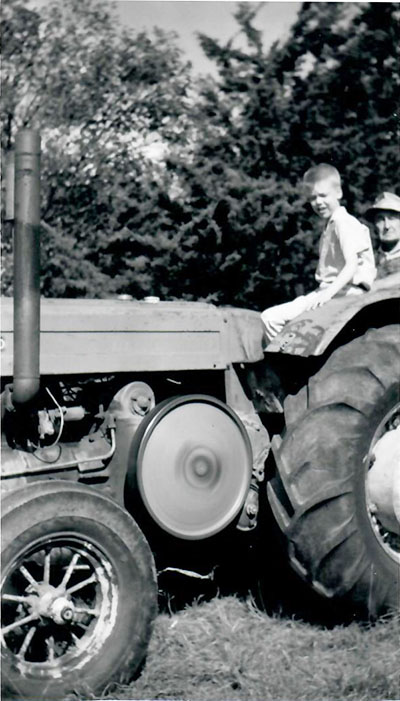
Of all events of in my daily life, the most painful set I can think of is machine malfunctions, especially those involving internal combustion engines. In particular, amid these lower circles of hell, lawn tractor failures fall into the deepest abysses.
I have had a string of five of these during the last three years, nearly all of them freakishly unusual. Sigh.
On Saturday, my John Deere tractor, with 9.2 hours total use showing on the meter, refused to start at all. Just to be sure, I recharged the battery, but to no effect. To make a long story short, at this point the most likely explanation seems to be a dead starter. But because it isn't certain that is the problem, it is not as easy a matter as bringing a new starter to where the tractor is, but of bringing the tractor to the shop in New Hampshire. And if the tractor refuses entirely to move on its own, the situation really becomes problematic.
It is at least balm on the wound, and a pleasant surprise, that this event is still covered under warranty. And the people at John Deere service were as nice as they could be. I made it a point to drive up to New Hampshire, rather than using email or the phone. That was a good decision. They have computers and basic ability to use them, but the world of tractor repair is not a very high-tech one. It is populated by farmers in coveralls, and being able to talk face-to-face about the signs of solenoid failure and such made it easier for the staff to feel I was part of their world, I think. They scheduled pickup of the tractor within a few days, to be followed by its return a few days later, assuming all goes as we imagine.
It does leave me wondering that when I asked service staff if their experience was that a starter motor would fail after less than ten hours' use, the response was, Yes, it happens. Not very good quality control!
The picture, by the way, is of me as a boy with my grandfather Jo-Jo and his tractor, on his farm in Kansas. I loved the farm and the tractor and Jo-Jo.

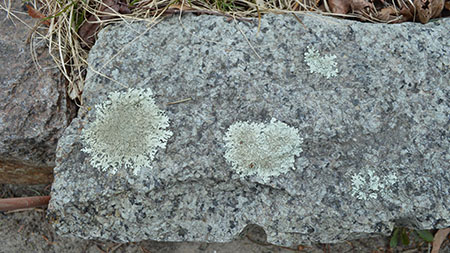
My knowledge of lichens is scant, to the point that I realize on casual inquiry that most of the few things I thought I knew about them are not actually true. I am not even sure what is a lichen, what a liverwort, what a moss, what a fungus. Somehow, my imagination had lumped lichens together with mosses, thinking that they would do best in the shade. – Wrong by almost 180°, it turns out.
My attention is drawn by the gradual appearance of clusters on stonework I have placed in the last dozen or so years. I would have guessed that the growth would take at least decades, if not generations. I didn't know I could have this seeming marker of hoary authenticity!
The most helpful words I have found on lichens recently is that there are many different kinds, with very individual and disparate tastes for light, temperature and surface.
One of the most common in my area and many others is, I learn, Flavoparmelia caperata, the common greenshield lichen. It grows preferentially on tree bark. It is more tolerant than other varieties of polluted air and may be found in cities. Indeed, I have seen it in Cambridge, across the river from Boston. The examples above and to the right below seem to me, as a layman, a close relative, Flavoparmelia baltimorensis, rock greenshield lichen. As its name suggests, this latter thrives on stone, even hard granite, newly split, or covered with carbon remaining as pollution from the coal-burning era. 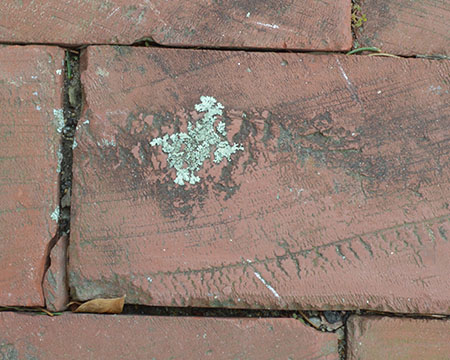 It seems less interested in brick, even though brick is softer and offers what I would have imagined a less forbidding surface.
It seems less interested in brick, even though brick is softer and offers what I would have imagined a less forbidding surface.

I realize that there are all kinds of other examples spread wide around me, which I am trying to learn about. One variety, widespread through the dunes of Crane Beach, appears to be Cladonia rangifera, often called reindeer lichen. It is soft and fluffy when damp, a bit brittle when dry.

As a matter of pure logic and hygiene, the timing of cleaning in spring seems strange to me. Wouldn't it make more sense to do it in fall, after windows are closed to wind-borne dust and there is less trekking back and forth from the outdoors?
And yet something just feels right about the activity as there is more light and we have renewed energy.
A couple of factors are moving me toward action now. One is that the winter so far has been very mild, allowing me to get ahead of outdoor chores that usually become consuming once the ground thaws. Another is the expected arrival of my organ in a couple of months, and the associated conversion of function from dining to music room. The space was in borderline need of repainting, a much easier task before placement of a new musical instrument than after.
Of course, cleaning is as hopeless a task as any other obsession. The more you take care of things, the more things you see that need taking care of. I am finding now that my attention is riveted, horrified, on the tops of surfaces that accumulate dust: window sills, door mullions, baseboard molding, picture tops. That much is fairly easy. A slightly damp cloth takes care of the worst of it. – Soon enough, the call of the outdoors will become irresistable. There will be many other things that needs to be done indoors, but they will be out of sight and out of mind.
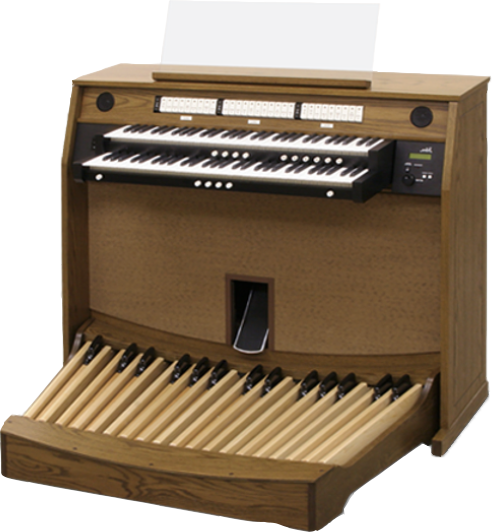
I have purchased an organ. It is supposed to arrive around May 1.
Ideally, I would have begun the instrument at a tenth of my current age – although it would have taken special arrangements for my feet to reach the pedals. Before proceeding, I set myself tests of my continuing ability to learn, working at skills I had never been able to master. I find that, if anything, my ability to learn is better than it was many years ago. There's less of mere determination, and more of judging calmly, as I go along, whether a given tactic is working or not. If not, it's not repetition that's lacking, but some approach I haven't figured out yet. I may not know what it is that's missing, but at least realizing that I'm missing a piece of the puzzle is a step forward.
Modern organs are increasingly electronic, almost exclusively so in the market niche I'm in. Today's electronics are amazing. It is a trivial task to match the sound produced a given pipe of a legendary organ, a Stradivarius violin, or other world-class musical instrument. It has become commonplace to mimic the reverberation that takes place in a concern hall as sounds bounce back and forth from one surface to another, and slowly decay. What has only recently worked its way into practice is to copy the sound pattern of some particular locale, usually a cathedral of enormous size with hard stone surfaces that reflect sound well. After a certain point, acoustics is empirical. Applying mathematical theory, you could come close, but computer chips haven't quite been there to match top-level physical sites. That's changed. Now, chips do a million calculations per second. At the touch of a switch, you can move your organ's sound from one famous cathedral to another.
But when my organ comes, I will begin at the beginning, and look to master basic fare. That will keep me busy for more than a while.
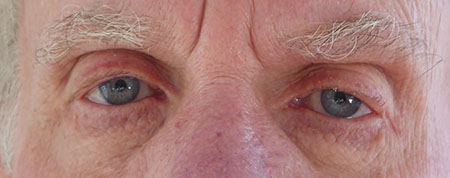
I have been aware for quite a few years that the lenses of my eyes have been developing increasing cloudiness that at some indefinite point began to qualify as "cataract." The condition has been coming on ever so slowly, faster than a glacier but not as fast as the tide. The effects to date have been very mild. I expected that the future would come sometime. It did.
A few days ago, I had a corrective procedure for the left eye. It took about ten minutes. There was no pain and no period of disability, at all. By the next day, my vision in that eye had improved from 20/70 to better than 20/20. That is galloping success. I had been looking forward to the procedure just to have it over with. There is another surgery scheduled for the right eye in a few weeks. This time around, I am feeling that I just can't wait – not simply to have it over with, but for the sake of better vision.
The helpfulness of volunteers through the Ipswich Council on Aging in transportation has been simply amazing. It is a group of wonderful people out that I had no previous acquaintance with.
© 2026 Paul Nordberg